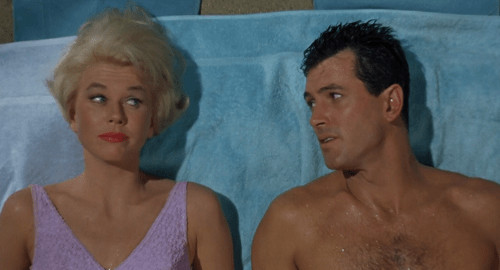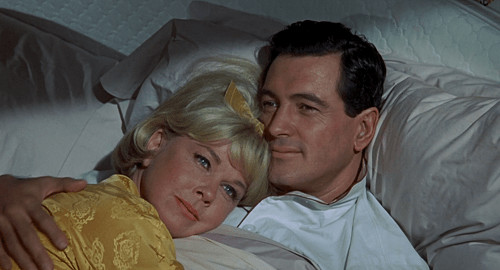Doris Day, a name synonymous with sunshine and classic Hollywood charm, would have celebrated her 99th birthday on this day. Her radiant on-screen presence and genuine warmth captivated audiences, making her a timeless favorite. For many, her collaborations with Rock Hudson are particularly memorable. Their on-screen chemistry was undeniable, and their off-screen friendship equally heartwarming. We fondly remember TCM’s tribute to Day, revisiting her early works and the delightful romantic comedies she starred in alongside Rock Hudson from the late 1950s to the early 1960s. In celebration of her birthday, we delve into these iconic films and the beautiful friendship they fostered, but also touch upon a poignant moment – Rock Hudson’s last photo taken publicly, alongside Doris Day, a bittersweet reminder of their enduring bond.
Pillow Talk (1959): The Spark Ignites
Directed by Michael Gordon, Pillow Talk introduced audiences to the magic of Doris Day and Rock Hudson as a duo. Day played Jan Morrow, an interior decorator, and Hudson portrayed Brad Allen, a playboy songwriter. Their shared party line becomes a source of constant conflict and comedic misunderstandings. Brad, intrigued by Jan, pursues her under the guise of a Texan rancher named Rex Stetson, leading to hilarious complications orchestrated by their mutual friend Jonathan Forbes (Tony Randall).
By this point in her career, Doris Day had already showcased her versatility, moving beyond musical ingénue roles to tackle dramas and thrillers. However, Pillow Talk presented a unique challenge for Rock Hudson. Primarily known for dramatic roles in films like his Douglas Sirk collaborations and his Oscar-nominated performance in Giant, Hudson was initially hesitant about comedy. He reportedly found the script “too risqué” and worried about damaging his masculine image. It was Doris Day who persuaded him to take the role, a decision that would alter both their careers.
Their connection was instant. Hudson playfully nicknamed Day “Eunice,” finding the name inherently funny when he thought of her. Day, in turn, called him “Ernie,” quipping, “he’s certainly no Rock.” This playful banter translated seamlessly onto the screen. Their genuine affection for each other was palpable, even when their characters were at odds. Day fondly recalled the set of Pillow Talk as “Every day on the set was a picnic – sometimes too much of a picnic, in that we took turns at breaking each other up.”
Pillow Talk was a resounding success, redefining their public personas. Day became a symbol of sophisticated sex appeal, while Hudson gained recognition for his comedic talent. The film dominated the US box office for seven weeks, becoming the fifth highest-grossing film of 1959. Accolades followed, including a Golden Globe for Day and World Film Favorite awards for both stars. Pillow Talk also garnered multiple Academy Award nominations, winning Best Original Screenplay and earning Day her only Best Actress nomination.
Lover Come Back (1961): Replicating the Magic
Two years later, Doris Day, Rock Hudson, and Tony Randall reunited for Lover Come Back, directed by Delbert Mann. The film mirrored the successful formula of Pillow Talk. Day played Carol Templeton and Hudson, Jerry Webster, rival advertising executives. Carol disapproves of Jerry’s unethical tactics, leading her to report him. Jerry retaliates by creating a fictitious ad campaign with nightclub performer Rebel Davis (Edie Adams). A mix-up leads to the fake commercial airing, forcing Jerry to invent a product, VIP, and enlist Dr. Linus Tyler (Jack Kruschen). Carol, aiming for the VIP account, mistakes Jerry for the inventor, setting the stage for romantic deception.

Image: Doris Day and Rock Hudson in Lover Come Back. Their comedic chemistry is evident in this still from the film, highlighting their successful on-screen partnership.
Lover Come Back consciously echoed Pillow Talk, with Day and Hudson’s characters initially clashing before romantic pretense leads to love. The on-set camaraderie remained, with Hudson recounting laughter-induced production delays. Despite this, the film was well-received, achieving box office success and critical acclaim. Lover Come Back earned Randall another Golden Globe nomination and an Oscar nomination for Best Original Screenplay, again co-written by Stanley Shapiro of Pillow Talk.
By 1961, Doris Day was at the zenith of her career. Following Pillow Talk and leading up to Lover Come Back and beyond, she starred in a string of successful comedies and worked with Hollywood titans like Cary Grant and James Garner. Despite her box office dominance, Day’s film career began to gradually recede later in the decade, but not before one final cinematic reunion with Hudson.
Send Me No Flowers (1964): The Final Film Pairing
Norman Jewison directed Send Me No Flowers, the third and final film starring Doris Day and Rock Hudson (along with Tony Randall). This film took a different turn from their previous collaborations. Unlike the original screenplays of Pillow Talk and Lover Come Back, Send Me No Flowers was adapted from a Broadway play. Here, Day and Hudson portrayed a married couple, Judy and George Kimball. George, a hypochondriac, mistakenly believes he is terminally ill. In his misguided attempt to secure Judy’s future, he enlists his friend Arnold Nash (Tony Randall) to find her a new husband, all while keeping his supposed diagnosis a secret from Judy, leading to suspicion and comedic misunderstandings.

Image: A still from Send Me No Flowers featuring Doris Day and Rock Hudson. This film marked their third and final on-screen collaboration, showcasing their enduring chemistry in a different comedic scenario.
Send Me No Flowers did not achieve the same level of success as their previous films and received mixed reviews. Hudson himself expressed his dislike for the film, finding its comedic treatment of death distasteful. While opinions vary, the film’s less enthusiastic reception signaled shifting audience tastes in 1964, as the New Hollywood era began to emerge.
A Reunion, A Farewell: Rock Hudson’s Last Public Appearance and Photo
While plans for a Pillow Talk sequel circulated shortly after its release, a reunion didn’t materialize until two decades later, under poignant circumstances. In 1985, Rock Hudson, battling AIDS, made his last public appearance on Doris Day’s new talk show, Doris Day’s Best Friends, on July 16th. This event is particularly significant as it provides context for Rock Hudson’s last photo, capturing a moment of friendship amidst personal hardship.
Despite being gravely ill, Hudson joined Day to launch her show, filmed at her home in Carmel, California. For Day, it was a precious opportunity to spend time with her beloved friend. She later reflected, “If there is a Heaven, I’m sure Rock Hudson is there because he was such a kind person.” Rock Hudson’s last photo from this appearance is a powerful image, a testament to their enduring bond and a somber reminder of the AIDS epidemic’s impact. Hudson passed away on October 2nd, 1985, less than three months after this heartfelt reunion.
Doris Day’s Lasting Affection
Doris Day passed away on May 13th, 2019, just shy of her 97th birthday. A month prior, fans gathered in Carmel to celebrate her birthday and the 60th anniversary of Pillow Talk, in an event benefiting her animal foundation. Day fondly reminisced about working with Hudson, saying, “I had such fun working with my pal, Rock. We laughed our way through three films we made together and remained great friends. I miss him.”
Image: Doris Day and Rock Hudson, a timeless Hollywood duo. Their on-screen partnership and genuine off-screen friendship continue to resonate with audiences, making them one of cinema’s most beloved pairs.
Doris Day’s career boasted an impressive roster of leading men, some of whom she collaborated with repeatedly. Yet, the mere mention of either Doris Day or Rock Hudson often conjures images of them together. Their effortless compatibility translated into captivating on-screen chemistry, radiating pure joy and solidifying their place as one of Hollywood’s most cherished pairings.
Day voiced a touching tribute to Hudson for TCM a few years before her passing, available here, offering further insight into their special connection. Hudson himself eloquently described their partnership: “I don’t really know what makes a movie team… I’d say, first of all, the two people have to truly like each other, as Doris and I did, for that shines through the sparkle, the twinkle in the eye as the two people look at each other.”
This piece is part of The Fifth Annual Doris Day Blogathon, celebrating the legendary star’s 99th birthday. Explore more tributes by clicking the banner below. [